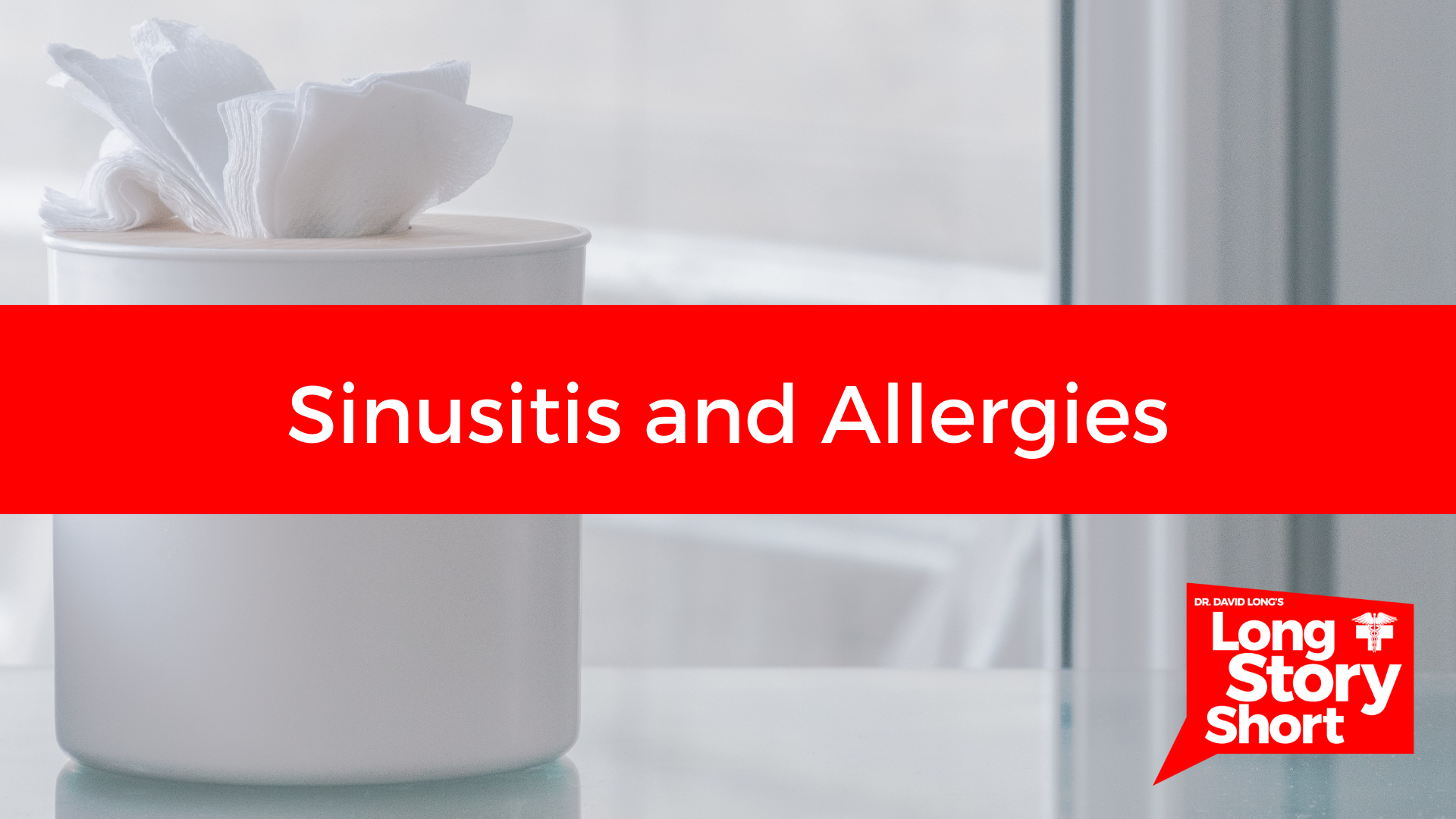Sinusitis and Allergies Summary
• Dr. David Long talks about sinusitis and how to distinguish it from allergies.
• Sinusitis symptoms include pain and pressure in the face or forehead, pressure behind the eyes, a worsening sore throat, and bad breath.
• Allergy symptoms include a runny nose, congestion, itchy watery eyes, pressure in the ears, and a sore throat.
• The main difference in treatment is that antihistamines are used to treat allergies while decongestants are used to treat sinusitis.
• Nasal steroids can be helpful for both allergy and sinusitis sufferers.
• Chronic sinusitis is defined as having those mentioned symptoms lasting for more than three months despite treatment attempts.
Full Text
The wind’s blowing. The sky is brown and allergy season is upon us. Have you ever had those times when your sinuses just feel like they’re going to explode? When you’re so congested, you can’t think straight? I’m Dr. David Long. I’d like to take just a minute to talk to you about sinusitis, and how to distinguish that from allergies.
One of the most common office visits that I have is a patient who’s coming in to be treated for either allergies or a sinus infection. And oftentimes it’s difficult to distinguish one from the other because there’s a lot of overlap in the symptoms. With allergies, you might have a runny nose and some congestion, itchy, watery eyes, maybe even a little pressure in the ears, sore throat. And there’s a particular kind of treatment that’s very effective for that. Contrast that with someone who really describes more pain and pressure in their face or in their forehead. Maybe they’ve got pressure behind their eyes. They’ve got a worsening, sore throat, even particularly bad breath, thick nasal discharge. Those are symptoms that are more consistent with acute sinusitis and infection. And to make things more complicated, you can begin with allergies, have more congestion, more drainage, things aren’t moving like they should, and then it gets infected and you have a sinus infection.
One thing that’s really important to remember though, is the treatment for them. There’s many reasonable treatments, but one of the mainstays of treatment is kind of opposite between the two. If I’ve got allergies, there’s not really any infection. It’s just my immune system, responding to pollen or dirt or dust, and I’m making more mucus to help protect me. That’s actually causing my symptoms. Well, one of the main areas of treatment is an antihistamine. Dry up that drainage, stop the runny nose, stop some of the congestion and it’s very effective, but you can imagine – if it wasn’t just allergies, if we actually had infection, then the last thing that we want to do is thicken those secretions to leave the infection in our sinuses.
No, in fact, we want to thin those secretions. I want my nose to run. I need to get the infection out. So on the allergy side of things, antihistamines like Zyrtec, Allegra, Claritin, Xyzal, even Benadryl, those are very effective, but I wouldn’t recommend those if your doctor suggests that you actually have some infection. Instead for this group, I would recommend Musinex. The generic name is guaifenesin. Oftentimes, it is coupled with a decongestant like Sudafed or Phenylephrine, which can decongest and open up your sinuses to help that drain out. One thing that’s helpful in both camps are nasal steroids, Flonase, Rhinocort, Nasacort. Those are available over the counter and used regularly, (they don’t work the day that you’ve used them), used regularly, they can cause a decrease in inflammation in your sinuses, be it from allergies or from infection, and provide a lot of relief.
Another subset of sinusitis that’s worth mentioning is chronic sinusitis. Now this would be someone who has those symptoms that I mentioned of the pressure and the pain, pressure behind the eyes, thick nasal drainage, but it lasts for three months or more despite treatment. Chronic sinusitis can be difficult to treat. Oftentimes someone might require surgery to correct a deviated septum, to go in and remove a polyp that could be clogging up the drainage system there. Things we have to remember though, if surgery isn’t an option, then maximizing the treatment of our allergies with nasal steroids or anti-histamines or leukotriene modifiers like Singulair.
These are other things that can be very helpful for that. Avoiding cigarette smoke, whether you’re the smoker or not, it doesn’t matter. It will keep your sinuses chronically irritated and more prone to infection. A humidifier can be very helpful. And maybe more important than any of those is improving the quality of your sleep through stress reduction, as a means of improving the efficiency of your immune system, coupled with nutrition, making sure that your vitamin D levels, vitamin C levels are optimized. Those would be the best ways to treat chronic sinus problems.
I hope you found that helpful. If you’d like some more information you can click on the link below or feel free to come by and see us at the Lubbock Cooper Health Center. Thank you.





 and then
and then